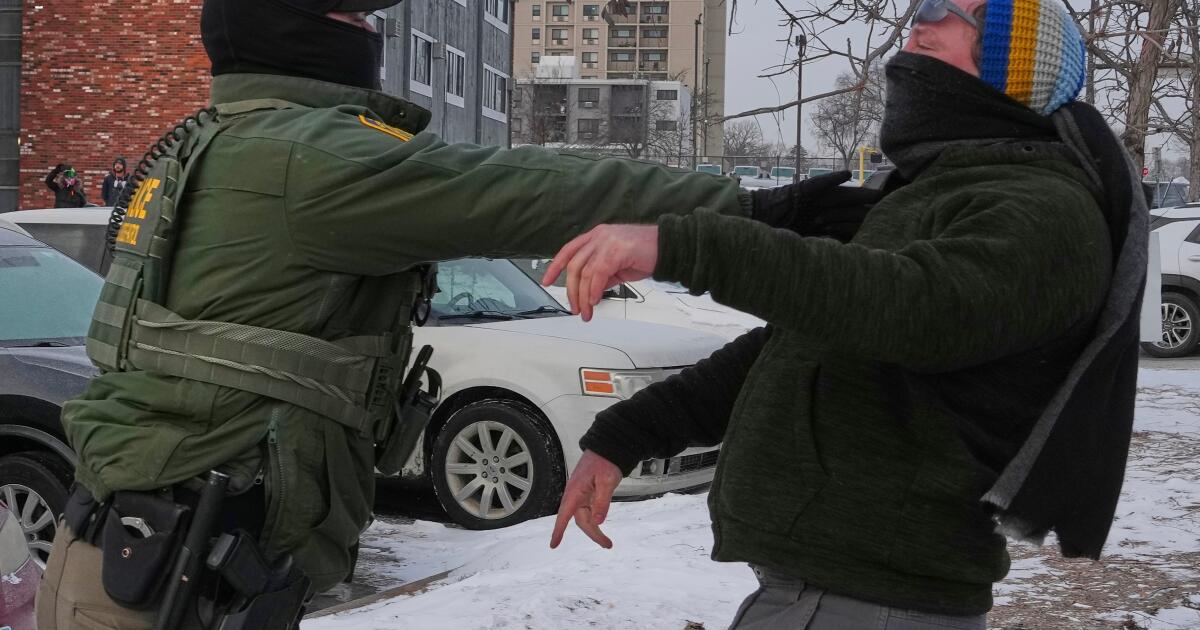Connecticut
Opinion: Tiny homes, big potential for CT's homeless

Blue and red lights flashed on the white curtains of the front windows in the darkness of early dawn as I left for my shift at Saint Rafael’s Hospital.
While emergency service vehicles are not uncommon on my downtown block, the square of sidewalk delineated by caution tape was unsettling. Even more so was the body in the center, covered only by a thin, stained white sheet. Based on the contour of the body, I immediately knew who it was: the young man who regularly slept on the stoop of the building next door.
Through the news media following his death, I learned he was a cook and bouncer who lost his job, then his housing during the height of the COVID pandemic. Once living on the streets, he became a recognized advocate for those experiencing homelessness in New Haven. Though there was never a specific cause of death named, the police eventually believed it was secondary to a medical condition.
His story is tragic but not unique: individuals experiencing homelessness die 30 years younger than those of us fortunate enough to have stable shelter. As a primary care physician at Yale New Haven Health, housing instability is as much a detriment towards my patients’ health as any disease.
Rosette Village offered New Haven a solution.
The Rosette Neighborhood Village began in 2022 as a protected space for individuals to set-up tents after the city began bulldozing tent cities throughout New Haven.
In October 2023, the community crowd-funded enough money to build six palette houses to shelter eight individuals; three months later, electricity was installed, allowing for heat, air conditioning, and the ability to power medical devices, such as a CPAP machine.
Unfortunately, despite Mayor Justin Elicker’s quotes that “Ensuring our residents have affordable, safe, and high-quality housing is a top priority,” he has actively attempted to dissolve the community since its inception. In July of this year, the mayor ordered power cut off for the community during a heat wave and issued an eviction declaration for the removal of the tiny houses.
Tiny house and pallet shelter communities for the unhoused have already proved successful in other metropolitan areas such as Madison, WI; Los Angeles, CA; and, Portland, OR as early as 2000. As of 2020, there were 91 tiny house villages, either open or slated to be opened, for those experiencing homelessness. New Haven can be added to this growing list with something as simple as a zoning law protecting these individuals and their homes.
In October of last year, homelessness was declared a state emergency, as it remains in a progressive housing crisis with a 14% yearly increase in the homeless population. In New Haven, 25% of residents live in poverty– 15 percentage-points above Connecticut as a whole. Similar data shows that New Haven apartment rentals and energy utilities cost an average of $750 and $125, respectively, more a month than the national average.
Given the ever-increasing demand, a shelter bed is hard to find in New Haven. Even if more shelter beds were available, it is common sense that a permanent residence, even if tiny, offers multiple benefits when compared to a shelter, such as having a safe place to store belongings, including medications, stay during bad weather (those staying in shelters must leave, with their belongings, during the day) or allowing married couples to make a home together.
Housing and healthcare go hand-in-hand, and when there is not enough housing, as is the case in New Haven, the healthcare system feels the strain.
My colleagues and I have many stories of caring for patients who present to the emergency room for a meal or a place to sleep. This is not a sustainable, nor cost effective way to manage homelessness. However, returning to the streets is not a viable solution, especially as violent crime against unhoused individuals is increasing in New Haven.
Yet, I emphasize again; instead of encouraging a system that has shown to be effective, the City of New Haven is trying to shut down Rosette Village, which would evict eight more individuals, friends, neighbors to the street. While the threat of another heat wave has passed, we all feel the chill of winter approaching and yet, three months later, electricity has yet to be restored.
We may never get Mayor Elicker’s support, but he is not the only person who can address this. To my state congress people and local alders, will you please create legislation that will protect Rosette Village as well as future tiny village efforts which could offer safe and sustainable housing solutions to the nearly 3,500 Connecticut residents experiencing homelessness?
Miranda Savioli M.D. is a physician at Saint Rafael’s Hospital in New Haven.

Connecticut
Frigid cold temperatures to start the day

We have a very cold start to Friday with feel-like temperatures around -10 degrees with little relief in sight.
There is a cold weather advisory in effect until 11 a.m.
Temperatures will remain low throughout the day , with highs ranging from 10-20 degrees.
Overnight will remain calm and clear with brutally low 0-15 degree temperatures.
The weekend starts out a bit warmer, with highs near 20 degrees.
The coastal storm that was nearby continues to push out to the ocean and misses us.
Connecticut
Child welfare advocate: Connecticut’s DCF must improve, get more funding

The revelations continue on day two of the probable cause hearing for Jonatan Nanita, one of three people connected to the death of 11-year-old Jacqueline “Mimi” Torres-Garcia.
Something revealed through testimony was that a Department of Children and Families (DCF) worker, who was working with the family during a sibling’s neglect case, checked on Mimi via a video call.
Except that the person on the other end of the call was not Mimi, who was believed to have been dead for a year by that point. Instead, the social worker unknowingly spoke with a woman in her 20s pretending to be the 11-year-old.
NBC Connecticut spoke with Sarah Eagan, the state’s former Child Advocate and now head of the Center for Children’s Advocacy in Hartford, about the incident.
“That’s hard to reconcile, right?” Eagan said. “The timeline is really important […] as to when folks should have discovered–whether through the school system, child protection system, or other–what happened to Mimi Torres.”
Eagan said this case helps underline how DCf, while no longer under federal oversight, still faces major challenges.
“It’s not because they’re not trying,” Eagan said. “They need a lot of help to turn that ship around.”
Eagan recently wrote an op-ed, highlighting two reports about the DCF issued last summer; one by the state, another by the federal government. One of the reports outlined more than 3,000 incidents of children in DCF custody going missing over two years.
The other report stated the state didn’t meet the safety and well-being benchmarks of children involved with DCF.
“This is a system, in my view, that is really on the brink workforce-wise, service-wise, foster care availability-wise, practice-wise–and that really has to concern us as stakeholders,” Eagan explained.
Eagan said the biggest way to help fix the issues is with more funding.
“If we want to hold DCF accountable for fulfilling the state’s legal obligation to ensure the safety of children like Mimi Torres, they need the tools,” Eagan said.
She said millions more are needed, probably tens of millions. Eagan highlighted the upcoming short legislative session, during which budget adjustments can be made, which could be helpful.
Connecticut
Chilly temperatures continue for Thursday

While today is fair, it will be very cold and breezy.
The highs today are in the lower 20s with winds making it feel like single digits.
NBC Connecticut NBC Connecticut
By tonight it will be windy and brutally cold.
Wind chill “feels-like” is near negative 15 degrees.
The Sunday storm will give us glancing blow with a chance of some snow in Eastern CT and cold winds statewide.
Chilly temperatures will stick around for next week.
-

 Illinois1 week ago
Illinois1 week agoIllinois school closings tomorrow: How to check if your school is closed due to extreme cold
-

 Pennsylvania4 days ago
Pennsylvania4 days agoRare ‘avalanche’ blocks Pennsylvania road during major snowstorm
-

 Science1 week ago
Science1 week agoContributor: New food pyramid is a recipe for health disasters
-

 Technology1 week ago
Technology1 week agoRing claims it’s not giving ICE access to its cameras
-
Movie Reviews1 week ago
Movie Review: In ‘Mercy,’ Chris Pratt is on trial with an artificial intelligence judge
-

 Politics1 week ago
Politics1 week agoSupreme Court appears ready to keep Lisa Cook on Federal Reserve board despite Trump efforts to fire her
-

 News1 week ago
News1 week agoVideo: Jack Smith Defends His Trump Indictments During House Hearing
-

 Politics5 days ago
Politics5 days agoTrump’s playbook falters in crisis response to Minneapolis shooting














